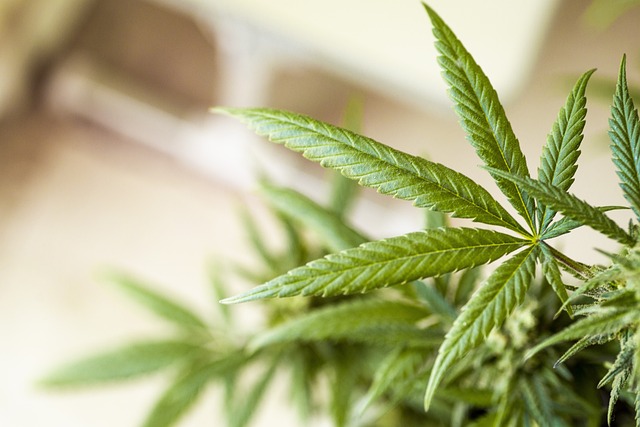THCA flower, a non-psychoactive component from cannabis and hemp, is gaining traction as an ingredient in skincare for its anti-inflammatory and potential therapeutic benefits. It's rich in THCA, a cannabinoid that interacts with the skin's endocannabinoid system to support healthy skin without mind-altering effects. THCA flower is particularly promising for sensitive skin, eczema, psoriasis, and acne due to its anti-inflammatory and antioxidant properties, along with omega fatty acids that reinforce the skin barrier. Beta-caryophyllene within THCA flower also exhibits anti-proliferative effects, adding to its potential for treating various skin conditions. However, it's important to approach its inclusion in skincare routines cautiously; users should perform patch tests to ensure compatibility with individual skin types and consult a dermatologist if necessary. Additionally, consumers must navigate the complex legal landscape surrounding THCA-rich products, ensuring they comply with regional regulations and purchase from reputable sources offering transparent labeling and third-party testing for quality assurance. Incorporating THCA flower into skincare requires a responsible and informed approach to fully realize its benefits while maintaining safety and legality.
Exploring the multifaceted relationship between THCA flower and skincare, this article delves into its potential benefits and side effects. From its scientific properties to individual skin response variability, we’ll navigate the nuances of incorporating THCA flower into your skincare routine safely and responsibly. Join us as we uncover how THCA flower can be a valuable addition to your beauty regimen, while also addressing legal and ethical considerations in sourcing this natural compound for skin care.
- Unveiling THCA Flower's Role in Skincare Regimens
- The Science Behind THCA Flower and Its Beneficial Properties for Skin Health
- Potential Side Effects of THCA Flower on Skin: An In-Depth Analysis
- Understanding the Variability of THCA Flower Skincare Responses Among Individuals
- Best Practices for Safely Integrating THCA Flower into Your Skincare Routine
- Navigating Legal Considerations and Ethical Sourcing When Using THCA Flower for Skin Care
Unveiling THCA Flower's Role in Skincare Regimens

The inclusion of THCA (Tetrahydrocannabinolic Acid) flower in skincare regimens has garnered significant attention due to its potential benefits. Unlike its psychoactive counterpart, THC, THCA is non-psychoactive and possesses a unique profile of cannabinoids that may contribute to healthy skin. Proponents suggest that the anti-inflammatory properties of THCA flower can soothe irritated skin, making it a valuable component for those with sensitive complexions or conditions like eczema and psoriasis. The antioxidant qualities found in THCA flower may also aid in combating signs of aging, such as fine lines and wrinkles, by protecting the skin from environmental stressors that contribute to these changes. When integrated into topical skincare products, such as creams and serums, THCA flower can provide a targeted approach to enhancing skin vitality without the mind-altering effects associated with THC consumption.
Furthermore, the integration of THCA flower into skincare formulations is supported by emerging research that highlights its therapeutic potential. Cannabinoid receptors, CB1 and CB2, are known to play a role in skin health, and THCA’s interaction with these receptors may offer benefits for various dermatological concerns. The non-intoxicating nature of THCA flower allows for its use in a broad range of skincare products, from moisturizers to masks, catering to individuals seeking natural and effective remedies for their skin. As the understanding of cannabinoids expands, the role of THCA flower in skincare is becoming increasingly recognized, potentially paving the way for innovative solutions in the realm of dermatological wellness.
The Science Behind THCA Flower and Its Beneficial Properties for Skin Health

Betulinic acid, a prominent cannabinoid found in the raw cannabis plant, known as THCA or Tetrahydrocannabinolic Acid, has garnered attention for its potential therapeutic properties. When consumed in its natural, non-psychoactive form, THCA is believed to offer various benefits, including positive effects on skin health. Studies suggest that THCA’s interaction with the body’s endocannabinoid system can influence sebaceous gland activity, potentially leading to improved skin conditions and a reduction in inflammation. Its anti-inflammatory and antioxidant properties may contribute to its use in topical applications aimed at addressing skin concerns such as acne, eczema, and psoriasis. The presence of omega fatty acids in THCA flower also supports the maintenance of healthy skin, promoting a barrier that protects against environmental stressors and moisture loss. Additionally, beta-caryophyllene, another component within the THCA flower, has been found to possess anti-proliferative properties which could be beneficial in treating certain skin conditions. The integration of THCA flower into skincare routines is a burgeoning field with promising results for those seeking natural alternatives to traditional treatments. As research continues to evolve, the full extent of its benefits for skin health becomes increasingly clear, making it a compelling ingredient for skincare enthusiasts and professionals alike.
Potential Side Effects of THCA Flower on Skin: An In-Depth Analysis

Delta-9-tetrahydrocannabinolic acid (THCA) is the non-psychoactive precursor to THC found in the cannabis plant, including hemp strains. As interest in cannabidiol (CBD) and other cannabinoids has grown, so too has the exploration of their potential benefits for skin care. THCA flower, rich in this cannabinoid, is being investigated for its therapeutic properties, which may include anti-inflammatory effects and the ability to support skin health. While topical applications of THCA are not psychoactive, it’s crucial to understand how it interacts with the body’s endocannabinoid system when applied to the skin.
When incorporating THCA flower into a skincare routine, users may experience various side effects. These can range from mild irritation and dryness to more severe reactions such as allergic contact dermatitis or sensitization, particularly if one has a cannabis sensitivity or allergy. It’s also important to note that the skin’s reaction to THCA can vary based on factors like skin type, individual sensitivity, and the specific formulation of the product used. Users with sensitive skin may be more prone to adverse reactions. Therefore, it is advisable to conduct a patch test before applying THCA flower-based products broadly to ensure compatibility and avoid potential side effects. Additionally, because the regulation of cannabinoid products can vary by region, consumers should source their THCA flower skincare products from reputable manufacturers that provide clear labeling and third-party testing results for safety and efficacy.
Understanding the Variability of THCA Flower Skincare Responses Among Individuals

THCA flower, which contains tetrahydrocannabinolic acid, a non-psychoactive cannabinoid found in the hemp plant, has garnered attention in the skincare realm for its potential benefits. The variability in skincare responses among individuals who use THCA flower products can be attributed to several factors. Genetic predisposition plays a significant role; each person’s skin is unique due to their genetic makeup, which influences how it interacts with THCA and other cannabinoids. Additionally, the endocannabinoid system’s reactivity is subject to individual differences, affecting how THCA flower influences sebaceous gland activity, oil production, and inflammatory responses within the skin. Environmental factors such as climate, pollutants, and personal lifestyle choices further contribute to this variability. For instance, those with oily skin types may find THCA flower for skin care particularly effective in regulating oil production, while others might experience dryness or irritation if their skin’s tolerance level is not adequately assessed. Conversely, individuals with sensitive skin should proceed with caution, as the potency of THCA can vary between products and brands. It is crucial for users to start with a low concentration of THCA flower in their skincare routine and observe how their skin reacts before incorporating it more frequently or at higher concentrations. Understanding these nuances is key to harnessing the benefits of THCA flower for skin care effectively and safely.
Best Practices for Safely Integrating THCA Flower into Your Skincare Routine

Incorporating THCA flower into your skincare routine can offer potential benefits, but it’s crucial to approach this integration with caution and knowledge. THCA flower, which contains tetrahydrocannabinolic acid, a precursor to THC, has been shown to exhibit anti-inflammatory properties, which may be beneficial for skin conditions characterized by inflammation. When integrating THCA flower into skincare, start with a low concentration to gauge your skin’s sensitivity and response. Topical applications are the safest way to use THCA flower for skincare; look for products specifically designed for this purpose, as ingestion can have different effects. Always source your THCA flower from reputable vendors who provide clear lab results confirming the product’s cannabinoid profile and purity.
To maximize the benefits and minimize potential side effects, it’s important to follow a consistent routine and pay close attention to your skin’s condition. Begin by cleansing your face to remove impurities, then apply a THCA flower-infused topical product directly to the areas of concern. Follow this with a moisturizer to seal in the benefits and protect your skin barrier. If you notice any adverse reactions, such as redness or irritation, discontinue use immediately and consult a dermatologist. Regularly assess how your skin responds over time; adjust the frequency and amount used accordingly. Remember to patch-test new products before full integration into your skincare regimen, ensuring compatibility with your unique skin type.
Navigating Legal Considerations and Ethical Sourcing When Using THCA Flower for Skin Care

When considering the use of THCA flower for skin care, it’s imperative to navigate the complex legal landscape that governs its cultivation, possession, and application. The Therapeutic Cannabis Acid (THCA) found in hemp or cannabis plants possesses unique properties that can be beneficial for skincare routines. However, the legality of THCA-rich products varies by region, with some areas allowing their use in cosmetics while others do not. It’s crucial to verify the current laws at both federal and state levels where one resides or intends to market such products. Additionally, sourcing THCA flower ethically involves ensuring that the product is obtained from reputable suppliers who adhere to sustainable and legal farming practices. This commitment extends to understanding the chain of custody to confirm the product’s purity and potency, as well as its compliance with relevant regulations. Ethical sourcing not only aligns with legal standards but also contributes to consumer safety and product efficacy in the realm of skincare. As such, businesses and consumers alike must prioritize due diligence when incorporating THCA flower into their skincare regimens. This due diligence includes thorough research into local laws, careful selection of suppliers, and a clear understanding of the product’s sourcing, handling, and manufacturing processes to ensure compliance with ethical standards and legal requirements.
THCA flower has emerged as a multifaceted component in skincare, offering potential benefits that merit consideration for those seeking to enhance their skin’s well-being. This article has delved into the various roles of THCA flower within skincare regimens, elucidating its scientifically backed properties and their implications for healthy skin. While highlighting the positive aspects of incorporating THCA flower into one’s routine, it is equally important to be aware of its potential side effects, which can vary among individuals. A prudent approach to integrating THCA flower into skincare involves understanding these effects, following best practices, and adhering to legal and ethical sourcing guidelines. Ultimately, consumers should approach the use of THCA flower for skin care with informed caution, balancing the excitement for its promising properties with a clear-eyed understanding of its limitations. By doing so, individuals can make the most informed decisions regarding their skincare choices and outcomes.


